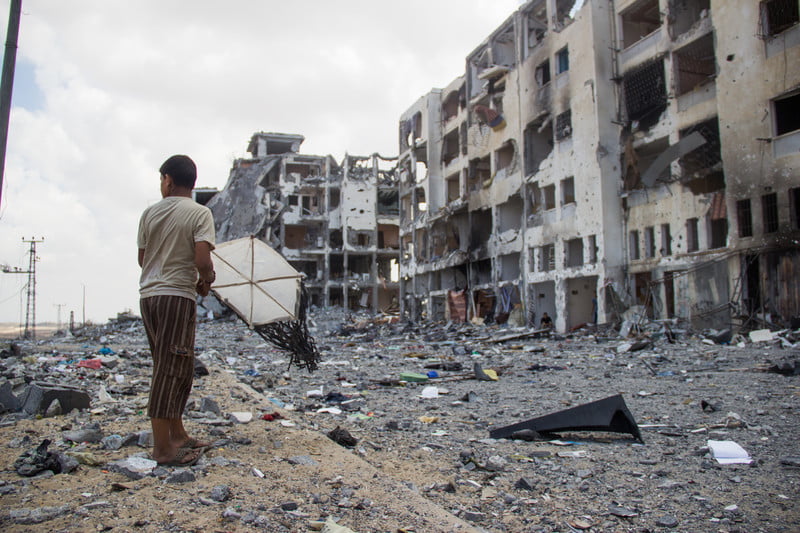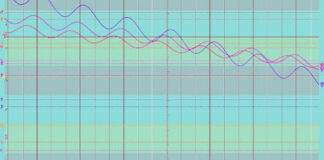
The destroyed al-Nada towers in Beit Hanoun, northern Gaza Strip, among the civilian infrastructure targeted by Israel during its 51-day assault on Gaza in 2014. ActiveStills
Maureen Clare Murphy,
The road to justice in Palestine has had plenty of checkpoints, roadblocks and other obstacles along the way.
The latest detour came with this month’s announcement by Fatou Bensouda, the chief prosecutor of the International Criminal Court.
Bensouda said that she had concluded her preliminary examination on Palestine, now in its fifth year, and was satisfied that requirements to launch a war crimes investigation had been met.
But she also requested that a pre-trial chamber of judges confirm the court’s jurisdiction to investigate alleged war crimes in the occupied West Bank, including East Jerusalem, and the Gaza Strip.
Israel, which effectively controls those territories, is not a signatory to the Rome Statute and thus not a member of the International Criminal Court. The state vehemently rejects ICC jurisdiction in the West Bank and Gaza.
A legal adviser to Israel’s government claims that “the Palestinians, by appealing to the court, seek to breach the established framework between the two parties and push the court to decide on political questions which should be settled in negotiations and not in criminal-judicial proceedings.”
For decades, Israel engaged in protracted political negotiations with Palestinian leaders as it simultaneously established facts on the ground in the form of settlements and other infrastructure to predetermine any political resolution.
Political negotiations are a framework still pushed by the UN’s Middle East peace envoy Nickolay Mladenov, and one that has prioritized a two-state solution over securing human rights.
The State of Palestine, which petitioned the ICC to investigate Israel, is a signatory to the Rome Statute but does not have sovereignty over the West Bank and Gaza, which are occupied by Israel.
Bensouda observes that the United Nations General Assembly, International Court of Justice and UN human rights bodies have “uniformly deemed” that Israel’s settlements and West Bank wall “obstruct the viability of a Palestinian state and a two-state solution and impinge on the realization of the Palestinian people’s right to self-determination.”
In other words, Palestinians do not have sovereignty over the West Bank and Gaza as a result of Israel’s war crimes.
But depending on how the pre-trial chamber rules on the question of jurisdiction, the unjust reality for which Palestinians seek redress could mean there won’t be any investigation at all.
Israel lashes out
Despite this uncertainty, Israeli Prime Minister Benjamin Netanyahu accused the court of anti-Semitism over Bensouda’s finding that there is a reasonable basis to believe that Israeli authorities have committed war crimes by transferring Israeli civilians to the West Bank.
“Just like we fought against anti-Semitic decrees 2,000 years ago, we have now learned of new decrees against the Jewish people brought by the International Criminal Court, that told us we have no right to live here,” Netanyahu said during a Hanukkah candle-lighting ceremony in Jerusalem.
Netanyahu is mentioned in Bensouda’s request to the pre-trial chamber.
“Despite the clear and enduring calls that Israel cease activities in the Occupied Palestinian Territory deemed contrary to international law, there is no indication that they will end,” she states.
“To the contrary, there are indications that they may not only continue, but that Israel may seek to annex those territories,” Bensouda adds. “In August and September 2019, Prime Minister Benjamin Netanyahu vowed to annex large parts of the West Bank if re-elected.”
Unilateral annexation of occupied territory by an occupying power has “no legal validity,” the chief prosecutor states. The acquisition of territory by force is inadmissible under international law, despite the greenlighting of Israel’s settlements by the Trump administration in Washington.

Israel’s energy minister Yuval Steinitz echoed Netanyahu’s claims, calling Bensouda’s announcement “a type of ‘blood libel,’” as the Haaretz newspaper reported – and which at least one of its opinion writers has since repeated.
Ayelet Shaked, an Israeli lawmaker who has promoted calls for genocide against Palestinian mothers, called Bensouda’s decision “hypocritical” and said that “Israel must battle it with all the means at its disposal.”
Bensouda rejected such claims, calling them “misled and unfounded”:
Human rights groups received the chief prosecutor’s announcement more warmly.
Three leading Palestinian human rights groups – Al-Haq, Al Mezan and the Palestinian Center for Human Rights – jointly stated that the ICC is “the only avenue for Palestinians to secure justice for Israel’s criminal breaches of international law.”
Amnesty International welcomed the end to Bensouda’s protracted preliminary investigation. Philip Luther from Amnesty called on the court’s pre-trial judges to “reach a conclusion swiftly and avoid further delays.”
Kenneth Roth, director of New York-based Human Rights Watch, said Bensouda’s finding “that there is a basis for her office to launch a formal investigation into the situation in Palestine affirms the urgent need for accountability for serious crimes committed there.”
Justice delayed
Bensouda was also criticized by human rights groups for requesting a ruling on jurisdiction.
“Bensouda’s decision to seek guidance from the court’s judges nearly five years into her preliminary inquiry means that perpetrators of serious crimes will not face justice at the ICC anytime soon,” Roth stated.
“The prosecutor should have proceeded directly with a formal probe as was within her power to do,” he added.
The three Palestinian human rights groups questioned why Bensouda “delayed for so many years in addressing such a seemingly integral question on territorial jurisdiction, especially as it was raised year after year” during her preliminary examination.
The groups added that “territories under occupation retain full sovereignty, which is merely temporarily de facto suspended and during which time, the occupying power exercises limited rights of administration over the territory and does not have rights of sovereignty.”
A pretrial examination of territorial jurisdiction in the occupied Palestinian territories “is a redundant and moot point, amounting to an unnecessary delay in the progression of the situation to full investigation,” the groups said.
In her 112-page request to the pre-trial chamber, Bensouda argues that the court does indeed have jurisdiction in the West Bank and Gaza. She also states “there is a reasonable basis to believe that war crimes have been or are being committed” in the territories.
“There are no substantial reasons to believe that an investigation would not serve the interests of justice,” she adds.

So why is Bensouda seeking a ruling on the matter, thus delaying an investigation while breaches of international law in the occupied territories are ongoing, as she acknowledges?
As more than one expert has observed, it leaves open the possibility that the judges will determine that the court has no jurisdiction – an argument made by Israel’s attorney general in a 34-page memo released hours before Bensouda’s announcement.
If the prosecutor thinks an investigation into war crimes in Palestine is warranted, why might she not want it to move forward?
It would invite the wrath of not only Israel but also the US, which has threatened to sanction the ICC and individuals associated with it if a Palestine investigation moves forward. The Trump administration closed the Washington offices of the Palestine Liberation Organization in protest over efforts to see Israeli officials prosecuted at The Hague.
Earlier this year, court judges declined to proceed with the chief prosecutor’s recommendation to investigate war crimes allegations in Afghanistan, in what critics said was a capitulation to US pressure and non-cooperation.
In that case too, Bensouda concluded that there was a “reasonable basis to believe” that war crimes had been committed by the US military, the CIA, the Taliban and Afghan state forces. But a pre-trial chamber – which has different judges than the one deliberating on jurisdiction in Palestine – determined that an investigation of alleged war crimes occurring since May 2003 “would not serve the interests of justice.”
That ruling is currently being appealed.
The request for a ruling on court jurisdiction could be a strategy to leave any fallout from inevitable litigation over the matter at judges’ feet. Bensouda may also wish to avoid deferring the determination of jurisdiction to the trial stage, after the conclusion of an investigation which will require substantial resources.
The pre-trial chamber which will rule on the matter is the same panel of judges who asked the chief prosecutor twice to reconsider her decision to close the file on Israel’s deadly raid on a flotilla headed to Gaza in international waters in 2010.
“In Israel’s case, the panel of judges hearing the request is not friendly,” Nicholas Kaufman – a lawyer who has worked at the International Criminal Court and for the Israeli military – told Haaretz.
Should an investigation move forward, what can be expected?
Gaza 2014
Bensouda has raised three examples of crimes meeting the threshold requirement of court jurisdiction in relation to the situation in Palestine.
Firstly, she states that there is a basis to believe that both the Israeli military and members of Hamas and other Palestinian armed groups committed war crimes during hostilities in Gaza during 2014.
Some 2,200 Palestinians in Gaza were killed during the 51 days of bombardment that summer, during which Israel dropped an explosive force roughly comparable to that of the Hiroshima atomic bomb. Around 1,500 of those Palestinians killed were civilians, including more than 500 children.
Seventy-one Israelis were killed during the hostilities, among them 66 soldiers, one security coordinator and four civilians, including a child. A foreign national was also killed in Israel.
The allegations against the Israeli military include launching disproportionate attacks, wilful killing, and intentionally attacking “objects or persons using the distinctive emblems of the Geneva conventions,” such as ambulances and hospitals.
Sixteen Palestinian health care workers were killed while on duty during the summer 2014 war, and 45 ambulances were damaged or destroyed.
According to the Paris-based human rights group FIDH, the Israeli military was given the locations of healthcare facilities and ambulance insignia in an effort to “secure respect for medical neutrality.”
Despite these efforts, more than 50 healthcare facilities included on the list of coordinates “were attacked and, in some instances, medical vehicles appear to have been directly targeted while transporting patients.”

As for potential war crimes committed by Hamas and Palestinian fighters, those include intentionally directing attacks against civilians and civilian objects, using protected persons as shields, depriving protected persons of the rights of fair and free trial, wilful killing, torture and inhuman treatment, and outrages upon personal dignity.
Some of those charges likely relate to the extrajudicial execution of at least 23 Palestinians accused of collaborating with Israel during the summer offensive. Six were publicly executed in front of a crowd of hundreds on 22 August 2014.
Amnesty International has previously said Hamas abuses during that period “amount to war crimes.”
“At least 16 of those executed had been in Hamas custody since before the conflict broke out,” Amnesty stated. “Many had been awaiting the outcome of their trials when they were taken away from prison and summarily executed.”
Whether cases of alleged war crimes committed by the Israeli military in Gaza in 2014 would be admissible to the ICC remains to be determined.
The court defers to a country’s internal investigations, where they exist. Israel has a self-investigation system – albeit one described by B’Tselem, the leading human rights group in the country, as a whitewashing mechanism that insulates the military from accountability.
Bensouda states that her office’s assessment “of the scope and genuineness” of Israel’s domestic proceedings “remains ongoing at this stage.” However, she has “concluded that the potential cases concerning crimes allegedly committed by members of Hamas and PAGs [Palestinian armed groups] would currently be admissible.”
Human rights groups have previously stated that human rights violations committed in Palestinian-controlled areas, while serious and may amount to war crimes, likely do not “amount to a policy or plan reaching the threshold of widespread or systematic attack against the civilian population.”
Settlements: “an open and shut case”
The second example given by Bensouda of a potential war crimes case that would arise from an investigation of the situation in Palestine is the transfer of Israel’s civilian population into West Bank settlements.
This is the allegation that has caused Israeli political leaders to lash out with accusations of anti-Semitism – and which also may leave them most vulnerable to prosecution.
As Michael Lynk, the UN special rapporteur on the human rights situation in the West Bank and Gaza, told Arab News: “On the settlement issue, it is an open and shut case: There is a strong argument that settlements are a violation of international law.”
Accountability “would apply to Israeli political and military leaders as well as settlers” involved in fundraising for and building settlements, Lynk added.

Bensouda’s third example of an investigation within her scope is the Israeli military’s use of force against Palestinians during Great March of Return protests in Gaza beginning in March 2018. More than 200 Palestinian civilians, including more than 40 children, have been killed during those demonstrations, and thousands more wounded by live fire.
Bensouda warned Israeli leaders that they were liable to prosecution for ordering sniper fire against protesters in April that year – before dozens of Palestinians, including a paramedic, were killed during a single day of protests the following month.
There is no overstating the significance of war crimes prosecutions at the International Criminal Court in the context of Palestine.
It would be the first time that the court would try war crimes suspects who aren’t African citizens.
And as Palestine remains the longest unresolved question to fall under the responsibility of the UN, it has “become a litmus test for the efficacy of the international system as a whole,” as a number of human rights groups stated earlier this year.
War crimes prosecutions would pierce Israel’s bubble of impunity, potentially deterring additional unnecessary loss of human life, suffering and destruction.
But it will not be the silver bullet to Palestine’s liberation.
The International Criminal Court, with its scope limited to the West Bank and Gaza, will not examine Israel’s crime of apartheid as a whole in all of historic Palestine.
The UN Committee for the Elimination of Racial Discrimination recently stated it “remains concerned at the maintenance of several laws” which discriminate against Palestinian citizens of Israel and Palestinians in the occupied West Bank and Gaza.
These laws “create differences among them, as regards their civil status, legal protection, access to social and economic benefits, or right to land and property,” the committee added.
And the International Criminal Court will not – at least at this stage – provide redress to the millions of Palestinian refugees denied the right to return to the lands from which their families were expelled before, during and after the establishment of Israel in 1948.
They remain disenfranchised from the statehood framework now being considered by a pre-trial chamber of judges.
Source: https://electronicintifada.net
Disclaimer: We at Prepare for Change (PFC) bring you information that is not offered by the mainstream news, and therefore may seem controversial. The opinions, views, statements, and/or information we present are not necessarily promoted, endorsed, espoused, or agreed to by Prepare for Change, its leadership Council, members, those who work with PFC, or those who read its content. However, they are hopefully provocative. Please use discernment! Use logical thinking, your own intuition and your own connection with Source, Spirit and Natural Laws to help you determine what is true and what is not. By sharing information and seeding dialogue, it is our goal to raise consciousness and awareness of higher truths to free us from enslavement of the matrix in this material realm.
 EN
EN FR
FR


























A most hopeless and depressing situation.
Same people that formed Israel control the worlds central banks. They are the same people who have financed both sides to every war fought for the last 200+ years. When you live your whole life being told that you are Gods special people. To them the rest of humanity is just garbage to do whatever unspeakable evil to on a daily basis. Read the Talmud and know that you are nothing but trash to them. Israel will keep doing what they have always done and if anyone dares to speak up they will scream to the heavens antisemite. The ICC will do nothing Benny is in full control. Don’t believe me look at Trump is Bennies stooge. Look at the law Trump just enacted in the US concerning Gods special little people. Israel has been committing war crimes since its inception. Look at the 6 day war attack against the USS Liberty. An American ship in International waters flying the American flag. Israel tried to kill all hands aboard. Killed 34 injured over another150. Why? Glad you asked. Well depending on who you talk to they were trying to get America involved in the war by doing……now wait for it…….that’s right a false flag on the Liberty and blame it on Egypt. The other school of thought was that the Liberty was a high tech listening vessel that was used to monitor the Soviets during the Cold War and well during the 6 day war Israel was shall we say being very zealous and in no mood to take prisoners. Shall we say some people did some things and lots of people died with their hands in the air.